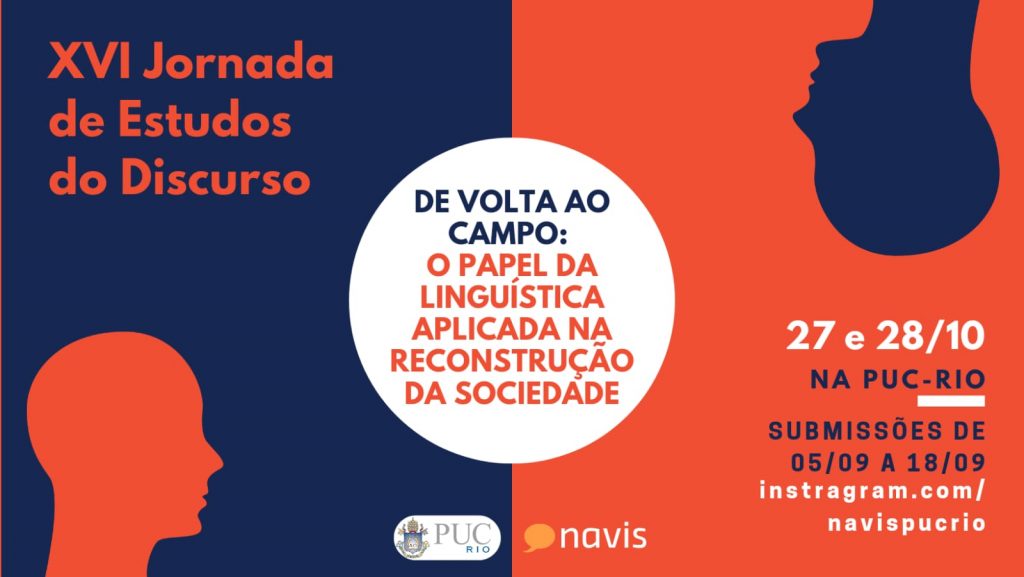Caderno de resumos disponível!
O grupo de pesquisa Narrativa e Interação Social (NAVIS) do Programa de Pós-Graduação em Estudos da Linguagem da PUC-Rio convida a todos, todas e todes para a XVI Jornada de Estudos do Discurso (JED) a se realizar nos dias 27 e 28 de outubro de 2022. A JED deste ano será presencial, no campus Gávea da PUC-Rio.

A Jornada desse ano tem como tema – De volta ao campo: o papel da Linguística Aplicada na reconstrução da sociedade. A temática busca estimular o diálogo sobre caminhos que podem ser trilhados por pesquisadores das Ciências Humanas diante da atual conjuntura sociopolítica, com foco no envolvimento de atores sociais diversos na produção de conhecimento, bem como a possibilidade para incidir em políticas públicas.

INSCRIÇÕES PARA SUBMISSÃO DE APRESENTAÇÕES ENCERRADAS!
As inscrições para submissão de apresentações orais acontecem entre os dias 05 e 23 de setembro (inscrições prorrogadas!). A taxa de inscrição para apresentação oral é de R$ 50,00 (cinquenta reais) a ser paga até o dia 21 de outubro via boleto. Para pagamentos posteriores a 21 de outubro, um novo boleto será gerado no valor de R$ 70,00 (setenta reais), com vencimento para 27 de outubro. Os interessados devem enviar um resumo de seus trabalhos em formato Word com até 300 palavras, espaçamento 1,5, fonte Times New Roman, tamanho 12, para o e-mail jed.pucrio@gmail.com. O texto deve conter o título do trabalho, palavras-chave, nome e sobrenome, instituição e e-mail do autor. É importante que o arquivo seja nomeado com o título do trabalho.
A Jornada seleciona trabalhos com foco no discurso, vinculados a projetos de pesquisa em andamento nas diversas áreas das ciências humanas e sociais, afiliados a diferentes tradições teórico-epistemológicas. O público das jornadas tem-se constituído de aluna/os e professora/es de graduação e pós-graduação envolvidos em pesquisas de programas de pós-graduação.
Os trabalhos serão avaliados por nossa comissão científica e as cartas de aceite e recusa serão enviadas no dia 07 de outubro. O caderno de resumos já está disponível! Acesse a página de Resumos e confira.
Veja abaixo a nossa programação completa:
Dia 27 de outubro (quinta-feira)


Dia 28 de outubro (sexta-feira)

Já as inscrições para ouvintes acontecem entre os dias 5 de setembro a 28 de outubro. É necessário o preenchimento deste formulário. A taxa de inscrição para ouvintes passará a ser GRATUITA. Aos que emitiram boletos anteriores e não pagaram, também ficarão isentos do pagamento. Já aqueles que efetivaram o pagamento e desejam o ressarcimento, no dia do evento estaremos efetuando o estorno total do valor.
Os certificados serão entregues no prazo de uma semana após o evento.

Esperamos vocês por lá!

Your comment is awaiting moderation.
Philosophy is the discipline that studies fundamental and universal questions, such as existence, cognition, values, reason, and language. It covers many topics and issues, from ethics and political figures to metaphysics and logic. Here are the main nuances of philosophy:
1. Definition of Philosophy
Philosophy comes from the Greek words “philos” (love) and “sophia” (wisdom). It is zeal to realize and make sense of the world around us and our place in it.
2. The Main branches of philosophy
– Ontology research of the essence of being and existence.
– Epistemology the study of the nature and limits of cognition.
– Ethics the analysis of ethical principles and concepts of good deed and evil.
– Logic research of the forms and principles of correct thinking.
– Political philosophy the study of questions of power, justice and the state.
3. Eminent Philosophers
Throughout the history of philosophy, many thinkers have made meaningful contributions to this science. Some of the most famous include:
– Socrates, considered the founder of Western philosophy.
– Plato, a student of Socrates, developed the doctrine of forms.
– Aristotle, the creator of logic and a large number of scientific fields.
– Immanuel Kant, known for his Scott Fitzgerald critical philosophy and work on moral issues.
4. The Relevance of Philosophy in the Modern World
Philosophy remains relevant in the modern world because enables people to understand complex social and moral issues, also develops critical thinking. It influences the legal system, politicians, and different fields of science.
5. Practical Applications of Philosophy
Philosophical ideas enter daily life. Ethical reflection helps people do the right thing in complex situations, and philosophical analysis contributes to most excellent understanding of problems related to technology, art, and social justice.
Philosophy is not only an academic discipline, as well as method of thinking assists us to understand life’s complexities and make informed choices.
Your comment is awaiting moderation.
Philosophy is the discipline that studies major and universal questions, including existence, cognition, values, mind, and language. It encompasses a vast number of subjects and problems, from ethics and political figures to metaphysics and logic. Here are the main nuances of philosophy:
1. Definition of Philosophy
Philosophy comes from the Greek words “philos” (love) and “sophia” (wisdom). It is zeal to understand and make sense of the world around us and our place in it.
2. The Main branches of philosophy
– Ontology research of the essence of being and existence.
– Epistemology the study of the nature and limits of knowledge.
– Ethics the analysis of ethical principles and concepts of good and evil.
– Logic the study of the forms and principles of correct thinking.
– Socio-political philosophy the study of questions of power, justice and the state.
3. Famous Philosophers
During the history of philosophy, almost many thinkers have made significant contributions to this science. Some of the most recognizable include:
– Socrates, considered the progenitor of Western philosophy.
– Plato, a pupil of Socrates, developed the doctrine of forms.
– Aristotle, the creator of logic and a huge number of scientific fields.
– Immanuel Kant, known for his Philosophy critical philosophy and work on moral issues.
4. The Relevance of Philosophy in the Modern World
Philosophy remains relevant in the modern world because it helps people to understand complex social and ethical issues, also develops critical thinking. It affects the legal system, politicians, and various fields of science.
5. Practical Applications of Philosophy
Philosophical ideas penetrate daily life. Ethical reflection helps people do the correct thing in difficult situations, and philosophical analysis contributes to best understanding of problems related to technology, art, and social justice.
Philosophy is including an academic discipline, yes and a way of thinking assists us to understand life’s complexities and make informed choices.
Your comment is awaiting moderation.
Philosophy is the discipline that studies fundamental and universal questions, such as existence, knowledge, values, mind, and language. It encompasses many topics and issues, from ethics and politicians to metaphysics and logic. Here are principal aspects of philosophy:
1. Definition of Philosophy
Philosophy comes from the Greek words “philos” (love) and “sophia” (wisdom). It is zeal to understand and make sense of the world around us and our place in it.
2. The Main branches of philosophy
– Ontology research of the essence of being and existence.
– Epistemology the study of the nature and limits of cognition.
– Ethics the analysis of moral principles and concepts of good and evil.
– Logic the study of the forms and principles of correct thinking.
– Political philosophy the study of questions of power, justice and the state.
3. Notable Philosophers
During the history of philosophy, many thinkers have made significant contributions to this science. Some of the most famous include:
– Socrates, considered the founder of Western philosophy.
– Plato, a pupil of Socrates, developed the doctrine of forms.
– Aristotle, the creator of logic and a huge number of scientific fields.
– Immanuel Kant, known for his Marcel Proust critical philosophy and work on moral issues.
4. The Relevance of Philosophy in the Modern World
Philosophy remains urgent in the modern world as it helps people to understand difficult social and moral issues, and also develops critical thinking. It affects the legal system, politicians, and different fields of science.
5. Practical Applications of Philosophy
Philosophical ideas enter daily life. Ethical reflection helps people do the correct thing in difficult situations, and philosophical analysis contributes to better understanding of issues related to technology, art, and social justice.
Philosophy is not only an academic discipline, but also a way of thinking assists us to understand life’s complexities and make informed choices.